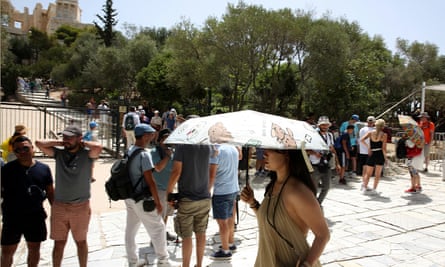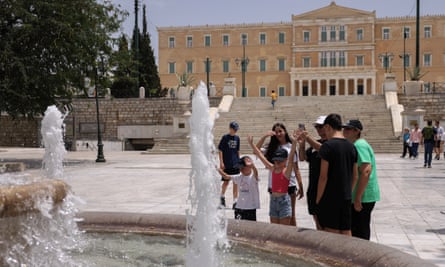The Acropolis, Greece’s most visited tourist site, was closed to the public during the hottest hours of Wednesday as the season’s earliest-ever heatwave swept the country, prompting school closures and health warnings.
The culture ministry had said the Unesco-listed archaeological site in Athens would close from midday to 5pm (09.00 to 14.00 GMT), with temperatures expected to reach 43C (109F) on Wednesday and Thursday.
The first heatwave of the year in Greece – which is regularly hit by searing summer temperatures – is due to peak over those two days, and the ministry said the measure could be extended.
Meteorologists have noted this is the earliest heatwave – which for Greece is classed as temperatures exceeding 38C for at least three days – in recorded history.
“In the 20th century we never had a heatwave before 19 June. We have had several in the 21st century, but none before 15 June,” said the state TV meteorologist Panos Giannopoulos.

The climate crisis and civil protection ministry has warned of a very high risk of fires in the Attica region around Athens.
Schools will stay closed in several regions of the country on Wednesday and Thursday, including in the capital, while the labour ministry has advised public-sector employees to work from home.
The ministry also ordered a pause from midday to 5pm for outdoor work, including food delivery, to Thursday.
Sheltering under a parasol, Fotis Pappous, an electrician, said he had started his workday a few hours earlier, at 6am, on orders from his employer. “With this kind of heat, it would be too risky otherwise,” said the 46-year-old as he tinkered with an electricity meter near Syntagma Square in central Athens.
But for staff working over a grill in the already-buzzing Plaka tourist district of the city, there was no room for respite.
“We have no choice, it’s the start of the tourist season,” said Elisavet Robou, a kebab store owner. “We have air conditioning and fans, and staff are allowed to take breaks, but unfortunately the climate crisis is here.”
“Heatwaves came earlier this year and the season will be difficult,” she added.
after newsletter promotion

An air-conditioned hall had been opened at the Syntagma metro station in central Athens to give people somewhere to shelter from the heat, the public transport authority said.
In Greece’s second city, Thessaloniki, schoolteachers and pupils said annual exams were held under difficult conditions.
“There was no air conditioning in any of the rooms so we used fans, some of which the teachers brought from their own homes,” said Andreas Karagiannis, a 52-year-old mathematician and examiner.
“Exams should not have been held under these conditions,” said Yiannis Theodoridis, a 17-year-old pupil.
The Acropolis was forced to close in July last year during a two-week heatwave that was unprecedented in its duration.
A record number of almost 4 million visitors flocked to the site last year, with its popularity boosted in part due to tourists arriving on cruise ships that called in at the nearby port of Piraeus.
Source: theguardian.com



